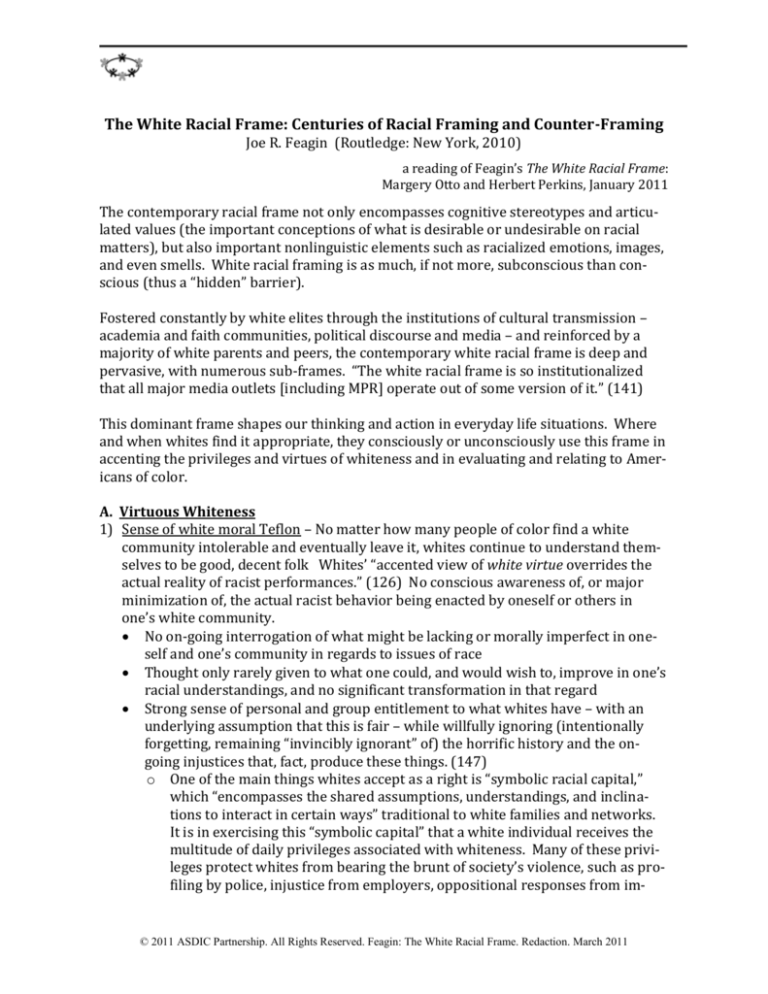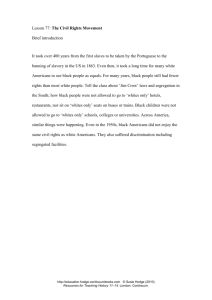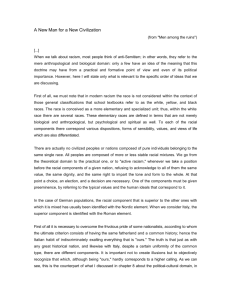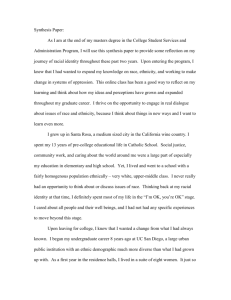
The White Racial Frame: Centuries of Racial Framing and Counter-Framing
Joe R. Feagin (Routledge: New York, 2010)
a reading of Feagin’s The White Racial Frame:
Margery Otto and Herbert Perkins, January 2011
The contemporary racial frame not only encompasses cognitive stereotypes and articulated values (the important conceptions of what is desirable or undesirable on racial
matters), but also important nonlinguistic elements such as racialized emotions, images,
and even smells. White racial framing is as much, if not more, subconscious than conscious (thus a “hidden” barrier).
Fostered constantly by white elites through the institutions of cultural transmission –
academia and faith communities, political discourse and media – and reinforced by a
majority of white parents and peers, the contemporary white racial frame is deep and
pervasive, with numerous sub-frames. “The white racial frame is so institutionalized
that all major media outlets [including MPR] operate out of some version of it.” (141)
This dominant frame shapes our thinking and action in everyday life situations. Where
and when whites find it appropriate, they consciously or unconsciously use this frame in
accenting the privileges and virtues of whiteness and in evaluating and relating to Americans of color.
A. Virtuous Whiteness
1) Sense of white moral Teflon – No matter how many people of color find a white
community intolerable and eventually leave it, whites continue to understand themselves to be good, decent folk Whites’ “accented view of white virtue overrides the
actual reality of racist performances.” (126) No conscious awareness of, or major
minimization of, the actual racist behavior being enacted by oneself or others in
one’s white community.
No on-going interrogation of what might be lacking or morally imperfect in oneself and one’s community in regards to issues of race
Thought only rarely given to what one could, and would wish to, improve in one’s
racial understandings, and no significant transformation in that regard
Strong sense of personal and group entitlement to what whites have – with an
underlying assumption that this is fair – while willfully ignoring (intentionally
forgetting, remaining “invincibly ignorant” of) the horrific history and the ongoing injustices that, fact, produce these things. (147)
o One of the main things whites accept as a right is “symbolic racial capital,”
which “encompasses the shared assumptions, understandings, and inclinations to interact in certain ways” traditional to white families and networks.
It is in exercising this “symbolic capital” that a white individual receives the
multitude of daily privileges associated with whiteness. Many of these privileges protect whites from bearing the brunt of society’s violence, such as profiling by police, injustice from employers, oppositional responses from im-
© 2011 ASDIC Partnership. All Rights Reserved. Feagin: The White Racial Frame. Redaction. March 2011
portant institutions, disapproval and exclusion from social networks, etc.
(137)
2) Belief in a great chain-of-being, with European-American “civilization” as its peak –
This frame provides the way most whites orient themselves in U.S. society. (95)
Understanding of white institutions to be the epitome of human accomplishment
(and white faith communities to be the manifestation of God’s presence in the
world). Interactions with people of color are approached from a strongly paternalistic frame. (131)
Assumption that the white worldview is the “natural” order of our society and
that people of color should accommodate and assimilate to it. White pressure for
conformance and assimilation has serious negative consequences for people of
color. (120-121)
No on-going interrogation of what white communities typically do not understand that communities of color do understand. By failing to actively interrogate
what one does not know – what is not visible from one’s position – a white community loses the normal human capacity to self-critique and to create space for
its own learning and growing. The failure to engage in a normal level of selfquestioning results in significant levels of ignorance. Because the ignorance is
not visible from within the white racial frame, whites do not perceive the seriously problematic nature of their understandings.
Thought is only rarely given to being guided by the wisdom from the margins,
and no significant transformation from the white norm in this regard
“Worshipful stance toward a supposed white superiority in knowledge, markets,
technology and political institutions,” e.g., assertion that the U.S. is the “best country” in the world. (147, 151)
3) Experience of whiteness as emotionally normative – e.g. whose race is “marked”,
who “belongs,” who is “naturally” one-of-us, who we find ourselves easily comfortable with
In the dominant frame, notions of human beauty are developed by whites; the
frame “beautifies” the white form and features, to the detriment of all others.
(107)
4) Denial of racism’s magnitude and impact – see Pew Research Center study, pp. 130131
Operating from the assumption that the white experience is the universal experience
Misperceiving and rarely thinking about the devastating destruction wrought by
racism (including within the white (faith) institution itself), and failing to
acknowledge and to explicitly address that devastation during social interactions
Believing the harm of racism to be limited to, and measuring the impact of racism
only as affecting, the particular individual of color involved in an incident; failing
to recognize the huge compounding of harms to the entire family and community.
© 2011 ASDIC Partnership. All Rights Reserved. Feagin: The White Racial Frame. Redaction. March 2011
5) Color-blind, “un-raced” nature of white thinking and acting
“We’re post-racial here” (despite all the research that proves that we do see race
and act on what we see in major ways)
“Let’s not discuss racism here” – learned pronounced discomfort in talking critically about issues of continuing white racism (99)
B. Negative Stereotyping of People of Color
In U.S. society today, white progressives “know” not to engage in negative stereotyping
in “front-stage interactions” – settings that include white strangers or people of color.
Instead whites “know” to engage in negative stereotyping only in “back-stage” settings –
settings that are all-white and where participants can assume that no serious objection
will be raised to the performance. In back-stage settings, the expression of the white racial frame and the lack of objection to that expression provide a “social glue” that creates
a sense of shared identity for the white group. (127-128)
“Even when whites do racist performances targeting Americans of color, the old racial
frame accents that they, as whites, still should be considered to be “good” and “decent”
people. The dominant racial frame not only provides the fodder for whites’ racist performances, but also the means of excusing those performances.” Such back-stage actions are interpreted as harmless, as “no big deal,” and often as just good interactive
“fun.” (129)
Back-stage racial performances provide the images and emotions that generate an array
of forms of discrimination by whites within the institutional contexts of society. (130)
“Everyday interactions of friends and relatives in these significant networks make up the
‘muscles and tendons that make the bones of structural racism move.’” (94)
1) Major forms of negative stereotyping – In the white racial frame, whites carry a (usually unconscious) sense of moral “Velcro” in their regard of people of color, a recurring suspicion that persons of color are behaving, or will likely behave, immorally.
Furthermore, this assumed immorality is perceived and responded to as a “serious
problem.” (Contrast this to white moral Teflon.)
2) Continuing white framing of indigenous peoples – primarily consists of rendering
indigenous peoples invisible. Without a victim there is no continuing crime. Without
any surviving native peoples, there are no remaining treaty rights to the land and
natural resources. Without any indigenous people visible to white perception, Native images can be freely parodied (sports mascots), sacred rituals and objects can
be appropriated, etc. (112)
Major framing of indigenous peoples takes the form of deeply embedded associations with:
“savages” and “blood-thirsty warriors” [the Fighting Sioux]
© 2011 ASDIC Partnership. All Rights Reserved. Feagin: The White Racial Frame. Redaction. March 2011
3) Continuing white framing of African American peoples: is highly developed and complex, compared with other groups of color. “Whites have long placed the anti-black
subframe at the heart of the white racial frame.” Thus we observe phenomenon such
as:
Most whites associate the phrase “people of color” as a referrant specifically to
African Americans. (99-100)
Blacks are hyper-visible to white eyes, including white liberal eyes. E.g., the majority of whites greatly exaggerate the size of the black population in the U.S. –
much more than the white misperception of the sizes of other populations of color. (102)
Personal journals used in Feagin’s research study show African Americans to
have been the subject of three-fourths of the racist performances reported, and
these anti-black performances were highly emotionally laden. (103)
Major framing of African Americans takes the form of deeply embedded associations
with:
animals and animalistic traits (subhuman)
deviant gender roles, hyper-sexuality and threat to white sexual performance
criminality, violence and danger
dirt and ignorance
claimed “ungrateful” and oppositional orientation (163)
incapacity for self-determination or self-protection, and therefore requiring
white paternalism and care
The primary emotional message is that African Americans are to be feared. (110)
4) Continuing white framing of Asian American peoples:
“an alien body and a threat to the American national family,” drawing from former associations with “the yellow peril.” (113)
devious, immoral and threatening to dominant society’s interests, including a distrust of Asian-American “purposes” in serving in the white-constructed role of
“model minority”
incapable of normal human communication, with white racial framing encouraging mocking of various Asian speech patterns and “accents”
5) Continuing white framing of Latino peoples:
“lower-scale people” in the “great chain-of-being,” lacking ambition and mental
capacity
invaders who carry disease and burden white society
“ridiculous” language conventions, readily able to be mocked by most whites
The white racial frame gives meaning and power to experience. A racist performance
(e.g., a racist joke) “resonates with these racist commentaries,” causing that racist performance to have much more impact on the thinking and actions of participants than the
performance would otherwise have. For example, a similar joke about whites would
© 2011 ASDIC Partnership. All Rights Reserved. Feagin: The White Racial Frame. Redaction. March 2011
not have this strong impact, because there is no negative anti-white frame in white
minds for such commentaries to resonate with.” (127).
Another example can be seen in the 2008 presidential election, during which white supremacist groups – and later most mainstream media and many Republican political
groups – focused intensively, for months, on a story about then-Senator Barack Obama’s
former African American minister, Dr. Jeremiah Wright, because of what the media regarded as his “radical” views of U.S. society. This mainstream media story lasted so long
because the image of a supposedly “radical” black minister resonates loudly with the
“dangerous black man” image in the white racial frame. In contrast, a somewhat similar
story about the controversial views of an arch-conservative, anti-Catholic minister who
was a friend and supporter of Senator John McCain did not last very long in the same
media. McCain’s minister story received less that one tenth of the coverage than the
Wright story received. The main reason is that there is no common framing in most
white minds of “white men as dangerous” for McCain’s minister to resonate with. So the
story about him died after a few days. (143-144)
C. Counter-Framing by communities of color (155-191)
People of color often pull the white racial frame to front-stage settings. This is necessary
if the frame is to be discussed, analyzed and addressed within the society. (99) Major
themes of counter-framing include:
accenting of the humanity and strengths of communities of color and their historical forebears – aggressive countering of negative stereotyped framing
evoking of the “liberty and justice for all” frame, with critique of its hypocrisy in
the context of U.S. society
acknowledgement and analysis of the “unjust enrichment” of whites
critique of white social structures and conventions, of the claimed morality and
wisdom of whites
calls to revolutionary action
© 2011 ASDIC Partnership. All Rights Reserved. Feagin: The White Racial Frame. Redaction. March 2011







